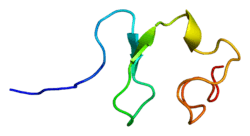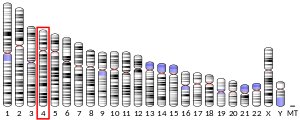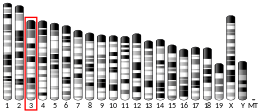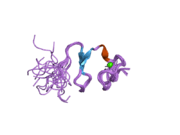Relaxin/insulin-like family peptide receptor 1
Relaxin/insulin-like family peptide receptor 1, also known as RXFP1, is a human G protein coupled receptor that is one of the relaxin receptors.[5]
References
- GRCh38: Ensembl release 89: ENSG00000171509 - Ensembl, May 2017
- GRCm38: Ensembl release 89: ENSMUSG00000034009 - Ensembl, May 2017
- "Human PubMed Reference:". National Center for Biotechnology Information, U.S. National Library of Medicine.
- "Mouse PubMed Reference:". National Center for Biotechnology Information, U.S. National Library of Medicine.
- "Entrez Gene: RXFP1 relaxin/insulin-like family peptide receptor 1".
Further reading
- Bathgate RA, Ivell R, Sanborn BM, et al. (2005). "Receptors for relaxin family peptides". Ann. N. Y. Acad. Sci. 1041: 61–76. doi:10.1196/annals.1282.010. PMID 15956688.
- Bathgate RA, Ivell R, Sanborn BM, et al. (2006). "International Union of Pharmacology LVII: recommendations for the nomenclature of receptors for relaxin family peptides". Pharmacol. Rev. 58 (1): 7–31. doi:10.1124/pr.58.1.9. PMID 16507880.
- Hsu SY, Kudo M, Chen T, et al. (2001). "The three subfamilies of leucine-rich repeat-containing G protein-coupled receptors (LGR): identification of LGR6 and LGR7 and the signaling mechanism for LGR7". Mol. Endocrinol. 14 (8): 1257–71. doi:10.1210/me.14.8.1257. PMID 10935549.
- Bartsch O, Bartlick B, Ivell R (2001). "Relaxin signalling links tyrosine phosphorylation to phosphodiesterase and adenylyl cyclase activity". Mol. Hum. Reprod. 7 (9): 799–809. doi:10.1093/molehr/7.9.799. PMID 11517286.
- Hsu SY, Nakabayashi K, Nishi S, et al. (2002). "Activation of orphan receptors by the hormone relaxin". Science. 295 (5555): 671–4. doi:10.1126/science.1065654. PMID 11809971.
- Strausberg RL, Feingold EA, Grouse LH, et al. (2003). "Generation and initial analysis of more than 15,000 full-length human and mouse cDNA sequences". Proc. Natl. Acad. Sci. U.S.A. 99 (26): 16899–903. doi:10.1073/pnas.242603899. PMC 139241. PMID 12477932.
- Sudo S, Kumagai J, Nishi S, et al. (2003). "H3 relaxin is a specific ligand for LGR7 and activates the receptor by interacting with both the ectodomain and the exoloop 2". J. Biol. Chem. 278 (10): 7855–62. doi:10.1074/jbc.M212457200. PMID 12506116.
- Ivell R, Balvers M, Pohnke Y, et al. (2004). "Immunoexpression of the relaxin receptor LGR7 in breast and uterine tissues of humans and primates". Reprod. Biol. Endocrinol. 1: 114. doi:10.1186/1477-7827-1-114. PMC 293425. PMID 14633277.
- Ota T, Suzuki Y, Nishikawa T, et al. (2004). "Complete sequencing and characterization of 21,243 full-length human cDNAs". Nat. Genet. 36 (1): 40–5. doi:10.1038/ng1285. PMID 14702039.
- Luna JJ, Riesewijk A, Horcajadas JA, et al. (2004). "Gene expression pattern and immunoreactive protein localization of LGR7 receptor in human endometrium throughout the menstrual cycle". Mol. Hum. Reprod. 10 (2): 85–90. doi:10.1093/molehr/gah019. PMID 14742692.
- Bond CP, Parry LJ, Samuel CS, et al. (2004). "Increased expression of the relaxin receptor (LGR7) in human endometrium during the secretory phase of the menstrual cycle". J. Clin. Endocrinol. Metab. 89 (7): 3477–85. doi:10.1210/jc.2003-030798. PMID 15240635.
- Liu C, Chen J, Kuei C, et al. (2005). "Relaxin-3/insulin-like peptide 5 chimeric peptide, a selective ligand for G protein-coupled receptor (GPCR)135 and GPCR142 over leucine-rich repeat-containing G protein-coupled receptor 7". Mol. Pharmacol. 67 (1): 231–40. doi:10.1124/mol.104.006700. PMID 15465925.
- Scott DJ, Layfield S, Riesewijk A, et al. (2005). "Identification and characterization of the mouse and rat relaxin receptors as the novel orthologues of human leucine-rich repeat-containing G-protein-coupled receptor 7". Clin. Exp. Pharmacol. Physiol. 31 (11): 828–32. doi:10.1111/j.1440-1681.2004.04075.x. PMID 15566402.
- Büllesbach EE, Schwabe C (2005). "The trap-like relaxin-binding site of the leucine-rich G-protein-coupled receptor 7". J. Biol. Chem. 280 (14): 14051–6. doi:10.1074/jbc.M500030200. PMID 15695505.
- Tang M, Mazella J, Zhu HH, Tseng L (2005). "Ligand activated relaxin receptor increases the transcription of IGFBP-1 and prolactin in human decidual and endometrial stromal cells". Mol. Hum. Reprod. 11 (4): 237–43. doi:10.1093/molehr/gah149. PMID 15722441.
- Hopkins EJ, Bathgate RA, Gooley PR (2005). "The human LGR7 low-density lipoprotein class A module requires calcium for structure". Ann. N. Y. Acad. Sci. 1041: 27–34. doi:10.1196/annals.1282.006. PMID 15956684.
- Bond CP, Parry LJ, Samuel CS, et al. (2005). "Increased expression of the relaxin receptor (LGR7) in human endometrium during the secretory phase of the menstrual cycle". Ann. N. Y. Acad. Sci. 1041: 136–43. doi:10.1196/annals.1282.020. PMID 15956698.
- Halls ML, Bathgate RA, Summers RJ (2005). "Signal switching after stimulation of LGR7 receptors by human relaxin 2". Ann. N. Y. Acad. Sci. 1041: 288–91. doi:10.1196/annals.1282.042. PMID 15956719.
- Muda M, He C, Martini PG, et al. (2005). "Splice variants of the relaxin and INSL3 receptors reveal unanticipated molecular complexity". Mol. Hum. Reprod. 11 (8): 591–600. doi:10.1093/molehr/gah205. PMID 16051677.
External links
- "Relaxin Family Peptide Receptors: RXFP1". IUPHAR Database of Receptors and Ion Channels. International Union of Basic and Clinical Pharmacology.
This article incorporates text from the United States National Library of Medicine, which is in the public domain.
This article is issued from Wikipedia. The text is licensed under Creative Commons - Attribution - Sharealike. Additional terms may apply for the media files.





